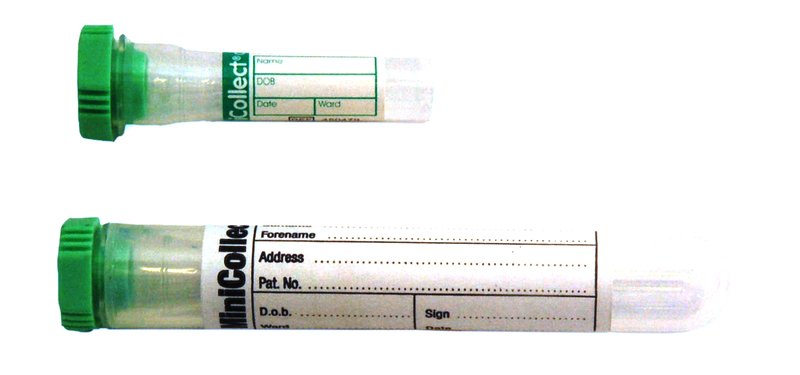Thyroid Function Tests (TSH, FT4, FT3)
Chemical Pathology
Notes
- Thyroid function tests (TFT's) include thyroid stimulating hormone (TSH, also known as thyrotropin), free T4 (FT4; thyroxine) and free T3 (FT3; tri-iodothyronine).
- These tests are variably indicated for investigation of possible hypo- or hyper- thyroidism, for monitoring of adequacy of thyroid hormone replacement, for monitoring of anti-thyroid treatment, for the investigation of the hypothalamic-pituitary-thyroid axis and for management of thyroid carcinoma.
- TSH provides the frontline investigation of thyroid disease with FT4 and FT3 being reflexed by the laboratory as appropriate based on the TSH result, previous results, and available clinical details.
- TSH is not useful in hypothalamic pituitary disease as normal levels may be seen, rather FT4 should be assayed. Emphasize the knowledge or possibility of hypothalamic pituitary disease on the request form and contact the laboratory as soon as possible if TSH has been reported without FT4 in this situation.
- TFT's may be misleading in patients with non-thyroidal illness. Unless there is a strong suspicion of thyroid disease these tests are not advised on hospital in-patients because of the difficulty in result interpretation. TFT's should be delayed until 3 months post the acute illness.
- Wait at least 2 months after any change in thyroid hormone replacement before repeating the blood tests.
- TSH levels may remain suppressed for many months after treatment for thyrotoxicosis has commenced. FT4 and FT3 provide better information for clinical management.
- Amiodarone may precipitate thyroid problems and TFT's should be performed before treatment starts and every 6 months thereafter. The recommended time for follow up of thyroid function post amiodarone therapy is 12 months.
- Lithium can interfere wth thyroid function and patients on this medication should be regularly monitored with thyroid function being checked before commencing the drug and then every 6 months therafter along with renal funciton and calcium levels (refer to National Safer Lithium Therapy information).
- Thyroid peroxidase antibodies should be measured if the TSH result is borderline high on two occasions and there are no overt symptoms of hypothyroidism as this will guide the frequency of future monitoring.
Sample requirements
- If patient on high dose biotin therapy (>5mg/day) collect sample at least 8 hours after the last dose.
For adults, blood taken into a 5mL gold top gel tube (or rust top for the Acute Unit)

For children, blood taken into a 3.5mL rust top gel tube

For neonates, blood taken into a 0.8mL minicollect lithium heparin tube

Storage/transport
Send at ambient temperature to the laboratory. If unavoidable, samples can be stored refrigerated overnight.
Required information
Relevant clinical details including whether for diagnosis or follow up. Current treatment especially T4 replacement, anti-thyroid drugs, post thyroid surgery, radioiodine or amiodarone and any history or suspicion of pituitary disease.
The department has a specific testing strategy for Thyroid Function Testing that is based on NICE guidance. This strategy can be found here: GHNHSFT Clinical Biochemistry Thyroid Testing Strategy.pptx
Turnaround times
The assays are run throughout the day and night.
The in-lab turnaround time is normally less than 24 hours.
The test can be ordered as an urgent request.
Reference ranges
Adult Reference Ranges:
TSH: 0.27 - 4.2 miU/L
FT4: 12.0 - 22.0 pmol/L
FT3: 3.1 - 6.8 pmol/L
Source: Reference Intervals for Children and Adults - Elecsys® Thyroid Tests’, Roche Diagnostics Limited, 2021).
Age-related reference ranges for children apply as displayed in the table below.
Please note there are also pregnancy related reference ranges displayed below.
| 0 -6 Days | 7-14 Days | 15 Days - 16 Years | |
|---|---|---|---|
| TSH (mIU/L) | 0.7 - 15.2 | 0.72 - 11.0 | 0.27 - 4.2 |
| Free T4 (pmol/L) | 11.0 - 32.0 | 11.5 - 28.3 | 12.0 - 22.0 |
| Free T3 (pmol/L) | 2.7 - 9.7 | 3.0 - 9.3 | 3.1 - 6.8 |
| 1st trimester | 2nd trimester | 3rd trimester | |
|---|---|---|---|
| TSH (mIU/L) | 0.3 - 4.6 | 0.4 - 4.1 | 0.2 - 3.2 |
| Free T4 (pmol/L) | 12.1 - 19.6 | 9.6 - 17.0 | 8.39 - 16.0 |
| Free T3 (pmol/L) | 3.8 - 6.0 | 3.2 - 5.5 | 3.1 - 5.0 |
Sources:
Paediatric Ranges: Bristol Children's Hospital (adopted to harmonise ranges).
Pregnancy Ranges: Reference Intervals for Children and Adults - Elecsys® Thyroid Tests’, Roche Diagnostics Limited, 2021
Further information
To learn more about thyroid function testing visit Lab Tests Online or visit the British Thyroid Association website which includes links to various guidelines relating to the investigation and management of thyroid disorders.
Thyroid Stimulating Hormones - https://my.clevelandclinic.org/health/articles/23524-thyroid-stimulating-hormone-tsh-levels
Page Last Updated: 10/11/22